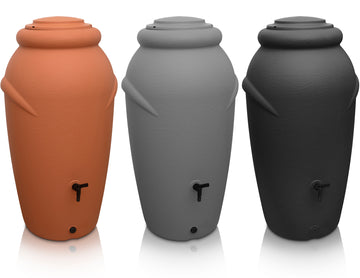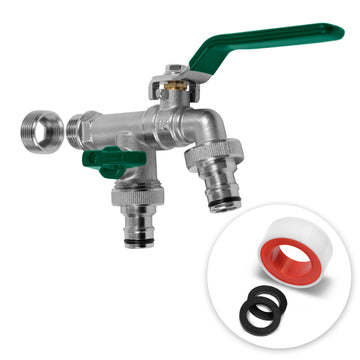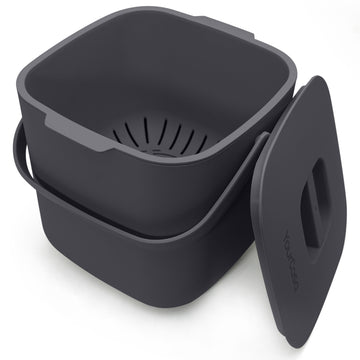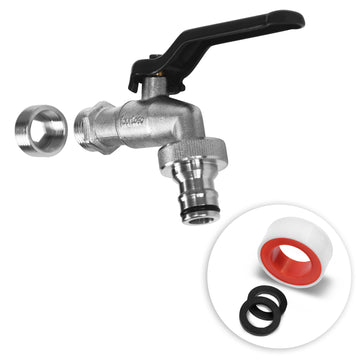
Water scarcity is a global challenge that affects us all. With the world's growing population and the effects of climate change, the problems surrounding the availability and quality of water are becoming ever more severe. This not only impacts our planet's ecosystems, but also ourselves and the way we live.
Farmers are struggling with droughts, people in many regions are having problems getting essential drinking water and there are signs of conflict over water sources in many places around the world. Therefore, every individual should become aware of the importance of water conservation and take steps to address this global crisis.
What is water scarcity? When there is water scarcity, the amount of existing water resources is not sufficient to meet the needs of all people, industries and ecosystems in an area. It arises from overuse and waste of water, climate change and pollution, leading to an imbalance between availability and demand. This has far-reaching consequences for society, the economy and the environment.
Water shortages are also an issue in Germany. Forests are becoming drier, wildfires are becoming more frequent, and droughts are causing farmers to suffer costly crop losses with increasing frequency. That's why we at YourCasa have made it our mission to educate you about the dramatic water shortage and show you how you can do your part in the fight against it .
Environmental impacts of water scarcity
A first step towards more water conservation in everyday life is to become aware of the effects that water scarcity has on the environment - because these are far-reaching.
Water scarcity in certain regions can cause entire ecosystems to lose their natural balance, which has been achieved over thousands of years . Rivers and lakes are drying up, which is... Biodiversity is impaired and ecological chain reactions are triggered. The soil in the area is degrading and becoming salinized. This not only leads to serious problems for flora and fauna, but also for us humans - because dried out, salty soil is every farmer's nightmare .
In addition, water scarcity also affects the quality of the remaining water . In declining waters, the concentration of pollutants increases, which of course leads to a deterioration in water quality. People who drink this water suffer, as do the aquatic ecosystems in these waters. Many organisms are extremely vulnerable to changes in their habitats and are therefore threatened.
Social impacts of water scarcity
The social impacts of water scarcity are also diverse. Although these are not yet particularly noticeable today, at least in Europe, they harbor great potential for conflict. Water is a basic human need. Everyone needs it – it is essential for survival. Nevertheless, according to the United Nations, in 2020, around 26% of the world's population, or around two billion people, did not have regular access to clean drinking water .
In some parts of the world, for example in many African countries, the lack of clean water causes health problems and significantly affects the quality of life. It is not uncommon for people in certain regions to travel long distances to clean water sources or rely on truck deliveries. This may result in education and economic development being hindered as a large proportion of time and resources are spent on water extraction. As a rule, socially disadvantaged sections of the population are most affected by water shortages. The lack of clean drinking water further increases this social inequality .
Speaking of potential for conflict: It is becoming increasingly likely that at least regional conflicts over water will break out in the coming years. Above all, the relationship between Ethiopia, Sudan and Egypt applies due to the construction of the The Grand Ethiopian Renaissance Dam is already considered extremely tense, as it will potentially lower the level of the Nile in the latter two countries for years and cause poor harvests. There are also (so far quite limited) confrontations between troops of the two great powers in the Himalayas, which primarily supply the two megastates India and China, but also other countries, with water.
In short: water scarcity poses a serious threat to us humans and our environment . Awareness of the existence of this problem is a first step towards tackling it. Even small individual contributions such as purchasing a rain barrel from YourCasa to effectively use rainwater in your own garden can have a big impact.
What is meant by rainwater harvesting?
If you are now wondering what you personally have to do with this, we will give you the answer straight away: You too can contribute to solving the global water crisis - by using rainwater.
Rainwater harvesting is an effective method to respond to water scarcity . Clean water is collected in rain barrels via a system of gutters and pipes and then used, for example, to water your own garden, flush the toilet or wash your car.
By using alternative water sources, such as collected rainwater, you can quickly and effectively reduce your water consumption and not only contribute to environmental protection, but also reduce your dependence on the local water supply system and even save money in the long run.
Advantages of rainwater harvesting
The increased use of rainwater offers you several advantages. One of the main benefits is the relief of pressure on municipal water supplies . Water treatment is expensive and emits CO₂ – and using treated water for things like gardening is not actually necessary.
Another big advantage is that by using rainwater you can significantly reduce your water bill - even after the first rain. Investing in a rain barrel from YourCasa can also be financially worthwhile after a short period of time.
You are also doing something good for the plants in your garden by using rainwater. Rainwater is more natural and softer than treated water from the municipal water supply system and is therefore better for the health of your plants.
You can read about the advantages you personally get from using rainwater in the following table:
| Advantage | Description |
| Reducing water bills | By using rainwater instead of expensive tap water, you can significantly reduce your water costs. |
| Relieving pressure on municipal water systems | Less dependence on public water supplies relieves pressure on these systems. |
| environmental Protection | Rainwater harvesting reduces your ecological footprint and your water footprint. |
| Improving plant health | Rainwater is often softer and contains fewer chemicals than tap water, making it ideal for garden irrigation. |
Installation of rainwater harvesting systems
Installing a rainwater collection system from YourCasa is very simple - and just as simply explained:
- Choose a rain barrel: First choose the right one Rain barrel out. Pay attention to size, design and material. The more it rains in your area or the larger your collection area (roof), the larger your bin should be.
- Installation: You can place the rain barrel in your garden yourself - professional help is usually not necessary. It is best to place the barrel directly under a downpipe, which directs the rainwater from the roof via a gutter directly into the rain barrel . Make sure that the bin is stable enough and does not tip over once it is full.
- To keep the water in the barrel as clean as possible, you can install a filter on the downpipe to keep coarse dirt from getting into the rain barrel.
That was it. You see: Using alternative water resources and counteracting the high water shortage and the unnecessary waste of clean water is actually quite simple. You can then use the water taken from the rain barrel in a variety of ways .

Tips for using rainwater in the garden
Last but not least, we would like to give you helpful tips on using rainwater in your garden - because there are a few things to consider.
In summer, the lower rainfall can quickly cause your garden to dry out. To avoid this and still not use clean drinking water for irrigation, you can install so-called drip hoses , which supply your plants with as little water as possible directly at the roots.
If you spread bark mulch around your plants, you can also work wonders. The mulch keeps moisture in the soil longer and reduces evaporation . This helps keep your plants moist for a long time with little water.
Successful examples of global rainwater harvesting projects
By the way: Rainwater is not only useful in your own garden. More and more projects are being implemented around the world to help people in countries with water shortages or in areas with difficult climatic conditions to gain access to drinkable fresh water or at least rainwater.
Bread for the World, for example, has provided the village of Gichunguri in Kenya with a tank to collect rainwater , which saves people long distances and supports them in the fight against water shortages.
TheThe United Nations continually tries to draw attention to the water shortage and promotes measures to help reduce global water consumption.



![Drei hohe YourCasa Regentonne 240 Liter [Wellen-Design] - Frostsicher & UV-beständige Gartentöpfe in den Farben Schwarz, Grau und Terrakotta, jeweils mit Drainagesystem für nachhaltige Bewässerung.](http://yourcasa.de/cdn/shop/files/ohnelogo_b8aeecac-557e-4106-a999-e77dcd160209.jpg?v=1707130230&width=360)






